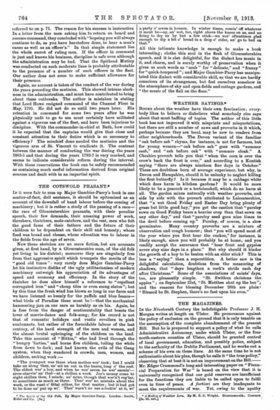WEATHER SAYINGS.*
Bowls about the weather have their own fascination; everybody likes to believe or disbelieve what somebody else says about that most baffling of topics. The author of this little book has not improved it with misprints and misquotations, but there are still a number of saws and proverbs in it which, perhaps because they are local, may be new to readers from other neighbourhoods. The Devon variant of the familiar "oak before ash" rhyme, for instance, is not for farmers, but for young women—" oak before ash" goes with "summer sash," and "ash before oak" with "summer cloak." A Cheshire proverb tells you that "when the corn is over the crow's back the frost is over," and according to a Kentish saying "there are always nineteen fine days in October." These are doubtless born of average experience, but why, in Devon and Hampshire, should it be unlucky to neglect killing the first butterfly ? Is it because it may be a cabbage white which does harm in kitchen gardens? It would be more likely to be a peacock or a tortoiseshell, which do no harm at all. The garden mixes naturally with weather proverbs, and side by side with the proverb attributed to Leicestershire, that "a wet Good Friday and Easter Day bring plenty of grass but little good hay," you get the caution that "parsley sown on Good Friday bears a heavier crop than that sown on any other day," and that "parsley seed goes nine times to the devil before coming up." Parsley, of course, is a slow germinator. Many country proverbs are a mixture of observation and rough humour ; that "you will spend most of the year where you first hear the cuckoo," for instance, is likely enough, since you will probably be at home; and you readily accept the assurance that "hoar frost and gypsies never stay nine days in a place." But why should it hinder the growth of a boy to be beaten with an elder stick? This is less a " saying " than a superstition. A better saw is the delightful calculation, doubtless from the measuring of shadows, that "days lengthen a cock's stride each day after Christmas." Some of the associations of saints' days, too, are pleasantly simple. "St. Swithun christens the apples " ; on September 21st, "St. Matthee shut up the bee"; and the reasons for blessing December 26th are plain: "Blessed be St. Stephen, there's no fast upon his even."


















































 Previous page
Previous page